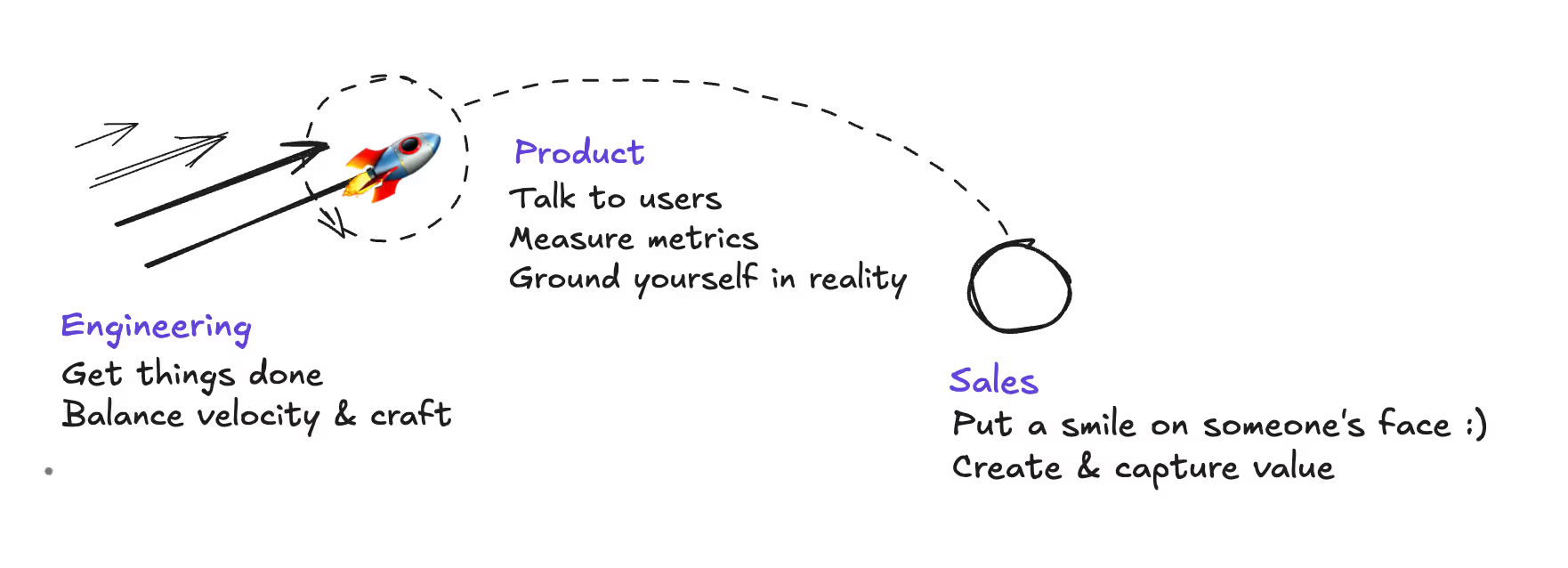Why All Engineers Need to Learn Sales
.avif)
In the age of AI, I believe the skill that engineers will need to focus on MOST is selling.
This can feel deeply uncomfortable at first. We’re taught that “sales” is a dirty word and great ideas speak for themselves. But that’s just not true. All engineers need to take a page from the “founders playbook” and learn how to persuade in order to maximize their impact.
Here’s why.
The Bitter Lesson Founders Learn Early
You can build the most technically impressive product in the world. You can even build something people use and like. But if you don’t spend enough time forging real relationships with specific potential customers, your dream is dead in the water.
If you build it, they may come, but they will not stay.
This is a lesson we learned early on at Nooks. We were trying to be all things for all people - offering free signups to our virtual workspace/productivity tool. We had decent monthly product usage, early adopters liked the features we were releasing, we talked to them every week … we thought we were on easy street.
But the moment we tried to build a sales motion and start selling annual seats we quickly found that:
- While casual users liked our feature set, they didn’t buy into our vision of AI powered collaboration. And were likely to churn the moment they saw something cheaper.
- There was a small but passionate niche of users that really saw value in AI — sales teams who were all doing the same thing (sales calls together). BUT to bring them true value we’d have to pivot the product and positioning significantly … a tall order given we barely even understood what “sales” was at the time.
After a long day of exhausting Zoom calls talking to the highest usage Nooks users about upgrading to an annual plan, and getting nowhere, my cofounder Rohan turned to me and said “We should have started selling this 6 months ago.”
We overcorrected quickly — the next month me, my cofounders/founding engineers all competed to see who could get the most net new customer demos booked over the phone. Quick feedback from prospects on our pitch and vision enabled us to gain conviction to “pivot” and focus solely on the sales automation use case. And the rest is history ….
I’ve heard similar war stories from almost every founder I’ve met (many of whom are happy Nooks early adopters now 😃). Almost all founders are technical builders. Many love talking to users, getting feedback and iterating. But often they hesitate to build real business relationships with customers — a.k.a, persuade them to pull out their wallet and buy. Even though that’s what it takes to hit escape velocity as a company.
And Why Engineers Need To Learn It Too
But this isn’t just a founder’s challenge. Ambitious engineers at startups actually face this all the time.
As an engineer, you might get a bright idea - reworking an existing feature or building something new. With new AI powered coding tools, executing on these sparks is easier then ever. You might pull a late night or a weekend building something cool with high impact potential …
And then you run up against a brick wall of indifference — whether from internal stakeholders or customers.
- Your teammates are worried about how to support it
- PMs don’t want to deviate from their carefully crafted roadmap
- Salespeople don’t want to change how they pitch the value of their tool
- Customers don’t speak “feature” and want to understand how this actually solves one of their burning pain points right now
Ironically this problem is actually worse at startups - where engineers go to get freedom and autonomy! BigCo solves for this by not letting engineers drive the roadmap. But joining somewhere like Nooks and then having your proposals stall out isn’t much better 😞
In my view, the best way to grow as an engineer is to scope and drive high velocity projects end to end. This is why you join a startup - to learn and grow as fast as humanly possible. Consequently, you’ll grow the fastest in an early stage environment if you “get good” at overcoming initial indifference and evangelizing the value of your own work.

Why Is This More Important Than Ever?
In this era of AI agent systems like Cursor, Windsurf, Claude Code for "vibe coding", of Deep Research for planning and refinement, building is easier than ever.
But just because you can build 5x or 10x as fast doesn’t mean you can deliver value that fast. Scaling up engineering means that ideas & code are now more of a commodity. The bottleneck now comes later in the process; making ideas marketable, and putting them in customers hands. How do you do that?
Well, by understanding how to sell (a.k.a the art of persuasion).
It’s easier said than done. Here are some tips:
Work with an internal team member first (and no, not just a PM). They’re usually happy to get an engineer’s time and will help you fill in pieces of the bigger picture.
Our engineers love working with our internal sales team that uses Nooks — you can directly reach out to them, demo and get them using new tools that our customer base will love too! Also, AE’s and CSMs generally are a great source of feedback - talking to one AE or one CSM is often a good substitute for taking hours of customer calls
Solicit and incentivize feedback from your company’s earliest customers. Look in the data to find your top users, find people that complain / or encourage ideas and give feedback. Ironically, often the biggest detractors are ones you can bring into the fold! Fix an issue for them next on-call and simultaneously build the trust to have them try a new solution to one of their big problems.
Some of Nooks’ most loved features were built after a particularly brutal on-call rotation. Frustrated customers can often give the most honest feedback about what isn’t working, and can be the most open to trying new things.
Innovation isn’t just for hackathons or weekends. We have a HUGE hackathon culture at Nooks (80% of our hackathon projects from our Q1 hackathon actually shipped - more on that later). But even if your team, like ours, does hackathons once a quarter, that’s not the only time you can push innovative ideas.
Experiment that takes a week and has a 30% chance of success? A bold RFC that’s going to require buy in from a lot of different people or teams? After a project you’ve worked on has just completed and shipped successfully it’s often much easier to justify the risk.
Some might think a focus on sales dilutes the passion that brings people to engineering in the first place. But I would disagree.
I love training AI models, and the (rare) chance these days to do deep and meaningful technical work. I don’t love persuasion in the same way - but in some ways I’ve grown to find it empowering. If you as an engineer can’t craft your own compelling story about the work you’re doing, then is it even worth doing? And conversely, if it is, why let anyone else tell your story?







